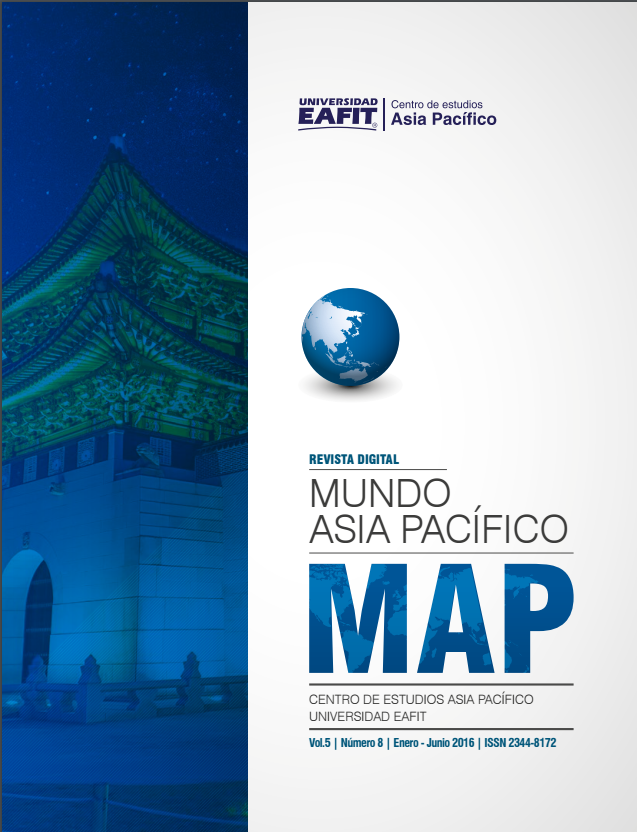Aproximación a la influencia del Confucianismo en la cultura corporativa coreana. ¿Clave para entender el "milagro" coreano?
Main Article Content
Keywords
Confucianismo, República de Corea, República Popular China, Religión, Cultura Corporativa
Resumen
El presente artículo pretende realizar una aproximación a la influencia del Confucianismo en el exitoso desarrollo económico de Corea. Para esto, en primer lugar se realizará una breve reseña del Confucianismo, sus valores y características. En la segunda parte, se revisará cómo estos valores ejercen influencia en la cultura corporativa coreana, desde su estructura organizacional hasta los vínculos entre empleados y superiores. Por último, se pretende mostrar si en definitiva, se debe el impresionante crecimiento de Corea a este cúmulo de enseñanzas.
Descargas
Los datos de descargas todavía no están disponibles.
Referencias
Althusser, Louis. (1989). Ideología y aparatos ideológicos del Estado. Ed. Quinto Sol, pp 27-36.
Backman, Michael. (1999). The Business of Asian Values, en Asian Eclipse: Exposing the Dark Side of Business in Asia. N. York: J. Wiley, pp. 9-22.
Cho, Lee Jay and Chung Hoon Lee. (1995). The Government-Business Relationship in Korea: Cultural Dimensions” en Confucianism and Economic Development. Tzong Shian Yu and Joseph S. Lee eds. Taipei: Chung-Hua Institute for Economic Research, pp. 326
Hill, John S. (2007). Religion and the Shaping of East Asian Management Styles: A Conceptual Examination. Journal of Asia-Pacific Business, 8:2, pp. 59-88.
Hosftede, G y M. H. Bond. (1988). The Confucius Connection: from Cultural Roots to Economic Growth. Organization dynamics, pp 15-21.
Janelli, Roger. (1993). Making Capitalism. Stanford University Press, pp 124-155.
Janelli, Roger L. (1993). Making Capitalism: The Social and Cultural Construction of a South Korean Conglomerate. Stanford: Stanford University Press, capítulo 4 “Control from the Top”, pp. 124- 155 y capítulo 5 “Control at the Middle”, pp. 156-178.
Kee, Tan Soo. (2008). Influences of Confucianism on Korean Corporate Culture. Asian Profile, 36, pp. 1–15
Lee, Choong Y. (2012). Korean culture and its influence in business practice in South Korea. The Journal of International Management Studies,Volume 7, Number 2. October, pp 187-190.
Lee, Seungjoo and Sang-Young Rhyu. (2008). The Political Dynamics of Informal Networks in South Korea: The Case of Parachute Appointment. The Pacific Review, 21:1, pp. 45-66-344.
Lin, Tzong Biau y Lok Sang Ho. (1995). Is there a Link among Confucianism, Institutions, and Economic Performance? en Confucianism and Economic Development. Tzong Shian Yu. Taipei, Taiwan: Chung- Hua Institute for Economic Research, pp. 345-67.
López Aymes, Juan Felipe y Alejandra Salas-Porras. (2012). Korean Companies in Mexico: Business Practices and National Identity. Journal of Asia – Pacific Business, 13:4, pp 349-374.
Minkov, Michael y Vesselin Blagoev. (2013). Is there a distinct Asian management culture? Asia Pacific Business Review, 20:2, pp. 209-15
李,毓秀著《弟子规》。 (Li, Yuxiu. “Di Zi Gui” Instructions in Virtue from the Chinese Heritage). 2003. Buddhist Text Translation Society, p. 4.
Backman, Michael. (1999). The Business of Asian Values, en Asian Eclipse: Exposing the Dark Side of Business in Asia. N. York: J. Wiley, pp. 9-22.
Cho, Lee Jay and Chung Hoon Lee. (1995). The Government-Business Relationship in Korea: Cultural Dimensions” en Confucianism and Economic Development. Tzong Shian Yu and Joseph S. Lee eds. Taipei: Chung-Hua Institute for Economic Research, pp. 326
Hill, John S. (2007). Religion and the Shaping of East Asian Management Styles: A Conceptual Examination. Journal of Asia-Pacific Business, 8:2, pp. 59-88.
Hosftede, G y M. H. Bond. (1988). The Confucius Connection: from Cultural Roots to Economic Growth. Organization dynamics, pp 15-21.
Janelli, Roger. (1993). Making Capitalism. Stanford University Press, pp 124-155.
Janelli, Roger L. (1993). Making Capitalism: The Social and Cultural Construction of a South Korean Conglomerate. Stanford: Stanford University Press, capítulo 4 “Control from the Top”, pp. 124- 155 y capítulo 5 “Control at the Middle”, pp. 156-178.
Kee, Tan Soo. (2008). Influences of Confucianism on Korean Corporate Culture. Asian Profile, 36, pp. 1–15
Lee, Choong Y. (2012). Korean culture and its influence in business practice in South Korea. The Journal of International Management Studies,Volume 7, Number 2. October, pp 187-190.
Lee, Seungjoo and Sang-Young Rhyu. (2008). The Political Dynamics of Informal Networks in South Korea: The Case of Parachute Appointment. The Pacific Review, 21:1, pp. 45-66-344.
Lin, Tzong Biau y Lok Sang Ho. (1995). Is there a Link among Confucianism, Institutions, and Economic Performance? en Confucianism and Economic Development. Tzong Shian Yu. Taipei, Taiwan: Chung- Hua Institute for Economic Research, pp. 345-67.
López Aymes, Juan Felipe y Alejandra Salas-Porras. (2012). Korean Companies in Mexico: Business Practices and National Identity. Journal of Asia – Pacific Business, 13:4, pp 349-374.
Minkov, Michael y Vesselin Blagoev. (2013). Is there a distinct Asian management culture? Asia Pacific Business Review, 20:2, pp. 209-15
李,毓秀著《弟子规》。 (Li, Yuxiu. “Di Zi Gui” Instructions in Virtue from the Chinese Heritage). 2003. Buddhist Text Translation Society, p. 4.

